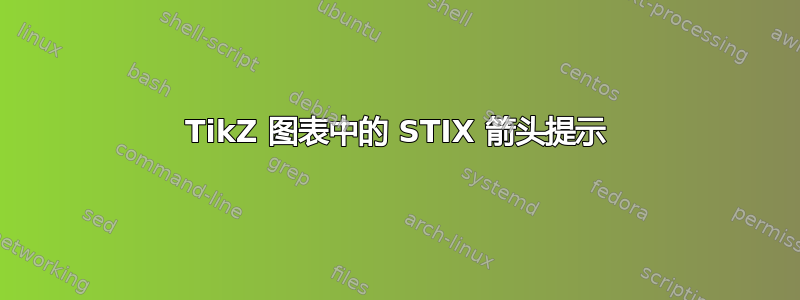
有没有一种令人满意的方法可以在 TikZ 图表中使用当前字体的箭头?我正在使用LuaLatex和fontspec包unicode-math来选择STIX Two字体,箭头看起来与 TikZ 图表中使用的箭头非常不同。
谷歌搜索让我相信目前还没有“支持”的方式来做到这一点,但也许有人在这里有办法大部分有效?
答案1
对于您的预期应用来说,这个答案可能有点晚了,但我碰巧在 TikZ 中重新创建了 STIX Two Math 箭头。如果您仍然需要它,您可以随意使用它。
我没有盯着原始箭头的屏幕截图并猜测控制点的位置,而是在 FontForge 中打开 STIX2Math.otf 并查找它们的确切坐标。(实际上我的意思是,我将这些箭头导出到 .eps 文件并使用它们。)因此它们应该与原始箭头几乎完全匹配。
我认为没有什么可解释的,所以我只粘贴下面的代码:
\documentclass{article}
%% Font setup:
\usepackage{ifluatex,ifxetex}
\ifluatex %% lualatex
\usepackage{fontspec,unicode-math}
\setmainfont{STIX Two Text}
\setmathfont{STIX Two Math}
\else
\ifxetex %% xelatex
\usepackage{fontspec,unicode-math}
\setmainfont{STIX2Text-Regular.otf}[
BoldFont = STIX2Text-Bold.otf,
ItalicFont = STIX2Text-Italic.otf,
BoldItalicFont = STIX2Text-BoldItalic.otf ]
\setmathfont{STIX2Math.otf}
\else %% (pdf)latex, presumably
\usepackage{stix2}
\fi
\fi
\usepackage{tikz}
%% Arrow declaration:
\makeatletter
\pgfdeclarearrow{
name = stix,
parameters = {\ifpgfarrowharpoon h\fi},
setup code = {
\ifpgfarrowharpoon
\pgfutil@tempdima=\dimexpr\pgflinewidth/68
\pgfarrowssettipend{247\pgfutil@tempdima}
\pgfarrowssetlineend{\pgfutil@tempdima}
\pgfarrowssetbackend{-81\pgfutil@tempdima}
\pgfarrowshullpoint{-81\pgfutil@tempdima}{224\pgfutil@tempdima}
\pgfarrowshullpoint{-58\pgfutil@tempdima}{247\pgfutil@tempdima}
\pgfarrowshullpoint{247\pgfutil@tempdima}{-34\pgfutil@tempdima}
\pgfarrowshullpoint{0pt}{-34\pgfutil@tempdima}
\else\ifpgfarrowreversed
\pgfutil@tempdima=\dimexpr\pgflinewidth/68
\pgfarrowssettipend{0pt}
\pgfarrowssetlineend{-\pgfutil@tempdima}
\pgfarrowssetbackend{-208\pgfutil@tempdima}
\pgfarrowsupperhullpoint{-208\pgfutil@tempdima}{181\pgfutil@tempdima}
\pgfarrowsupperhullpoint{-188\pgfutil@tempdima}{201\pgfutil@tempdima}
\pgfarrowsupperhullpoint{0pt}{34\pgfutil@tempdima}
\else\ifdim\pgfinnerlinewidth>\z@
\pgfutil@tempdima=\dimexpr\pgflinewidth/272
\pgfarrowssettipend{324\pgfutil@tempdima}
\pgfarrowssetlineend{\pgfutil@tempdima}
\pgfarrowssetbackend{-73\pgfutil@tempdima}
\pgfarrowsupperhullpoint{-73\pgfutil@tempdima}{285\pgfutil@tempdima}
\pgfarrowsupperhullpoint{-51\pgfutil@tempdima}{305\pgfutil@tempdima}
\pgfarrowsupperhullpoint{324\pgfutil@tempdima}{5\pgfutil@tempdima}
\else
\pgfutil@tempdima=\dimexpr\pgflinewidth/68
\pgfarrowssettipend{192\pgfutil@tempdima}
\pgfarrowssetlineend{\pgfutil@tempdima}
\pgfarrowssetbackend{-72\pgfutil@tempdima}
\pgfarrowsupperhullpoint{-72\pgfutil@tempdima}{181\pgfutil@tempdima}
\pgfarrowsupperhullpoint{-51\pgfutil@tempdima}{201\pgfutil@tempdima}
\pgfarrowsupperhullpoint{-192\pgfutil@tempdima}{5\pgfutil@tempdima}
\fi\fi\fi
},
drawing code = {
\ifpgfarrowharpoon %% harpoon
\pgftransformscale{\pgflinewidth/68}
\pgfpathmoveto{\pgfpoint{0}{34}}
\pgfpathcurveto{\pgfpoint{40}{34}}{\pgfpoint{44}{50}}{\pgfpoint{44}{66}}
\pgfpathcurveto{\pgfpoint{44}{94}}{\pgfpoint{-22}{156}}{\pgfpoint{-81}{224}}
\pgfpathlineto{\pgfpoint{-58}{247}}
\pgfpathcurveto{\pgfpoint{44}{147}}{\pgfpoint{117}{66}}{\pgfpoint{247}{-30}}
\pgfpathlineto{\pgfpoint{247}{-34}}
\pgfpathlineto{\pgfpoint{0}{-34}}
\pgfpathclose
\pgfusepathqfill
\else\ifpgfarrowreversed %% reversed arrowhead
\pgftransformscale{\pgflinewidth/68}
\pgfpathmoveto{\pgfpoint{0}{34}}
\pgfpathcurveto{\pgfpoint{-73}{78}}{\pgfpoint{-134}{138}}{\pgfpoint{-188}{201}}
\pgfpathlineto{\pgfpoint{-208}{181}}
\pgfpathcurveto{\pgfpoint{-185}{147}}{\pgfpoint{-152}{118}}{\pgfpoint{-124}{83}}
\pgfpathcurveto{\pgfpoint{-111}{65}}{\pgfpoint{-95}{33}}{\pgfpoint{-95}{0}}
\pgfpathcurveto{\pgfpoint{-95}{-33}}{\pgfpoint{-111}{-65}}{\pgfpoint{-124}{-83}}
\pgfpathcurveto{\pgfpoint{-152}{-118}}{\pgfpoint{-185}{-147}}{\pgfpoint{-208}{-181}}
\pgfpathlineto{\pgfpoint{-188}{-201}}
\pgfpathcurveto{\pgfpoint{-134}{-138}}{\pgfpoint{-73}{-78}}{\pgfpoint{0}{-34}}
\pgfpathclose
\pgfusepathqfill
\else\ifdim\pgfinnerlinewidth>\z@ %% double arrow
\pgftransformscale{\pgflinewidth/272}
\pgfpathmoveto{\pgfpoint{0}{136}}
\pgfpathcurveto{\pgfpoint{18}{136}}{\pgfpoint{27}{151}}{\pgfpoint{27}{159}}
\pgfpathcurveto{\pgfpoint{27}{175}}{\pgfpoint{20}{184}}{\pgfpoint{3}{202}}
\pgfpathcurveto{\pgfpoint{-8}{213}}{\pgfpoint{-48}{256}}{\pgfpoint{-73}{285}}
\pgfpathlineto{\pgfpoint{-51}{305}}
\pgfpathcurveto{\pgfpoint{69}{187}}{\pgfpoint{198}{100}}{\pgfpoint{324}{5}}
\pgfpathlineto{\pgfpoint{324}{-5}}
\pgfpathcurveto{\pgfpoint{198}{-100}}{\pgfpoint{69}{-187}}{\pgfpoint{-51}{-305}}
\pgfpathlineto{\pgfpoint{-73}{-285}}
\pgfpathcurveto{\pgfpoint{-48}{-256}}{\pgfpoint{-8}{-213}}{\pgfpoint{3}{-202}}
\pgfpathcurveto{\pgfpoint{20}{-184}}{\pgfpoint{27}{-175}}{\pgfpoint{27}{-159}}
\pgfpathcurveto{\pgfpoint{27}{-151}}{\pgfpoint{18}{-136}}{\pgfpoint{0}{-136}}
\pgftransformreset
\pgfpathlineto{\pgfpoint{0}{-.5*\pgfinnerlinewidth}}
\pgftransformxshift{208\pgflinewidth/272}
\pgftransformscale{\pgfinnerlinewidth/136}
\pgfpathlineto{\pgfpoint{-61}{-68}}
\pgfpathcurveto{\pgfpoint{-27}{-49}}{\pgfpoint{0}{-24}}{\pgfpoint{0}{0}}
\pgfpathcurveto{\pgfpoint{0}{24}}{\pgfpoint{-27}{49}}{\pgfpoint{-61}{68}}
\pgftransformreset
\pgfpathlineto{\pgfpoint{0}{.5*\pgfinnerlinewidth}}
\pgfpathclose
\pgfusepathqfill
\else %% normal arrowhead
\pgftransformscale{\pgflinewidth/68}
\pgfpathmoveto{\pgfpoint{0}{34}}
\pgfpathcurveto{\pgfpoint{18}{34}}{\pgfpoint{26}{44}}{\pgfpoint{26}{54}}
\pgfpathcurveto{\pgfpoint{26}{63}}{\pgfpoint{21}{74}}{\pgfpoint{12}{83}}
\pgfpathcurveto{\pgfpoint{-19}{115}}{\pgfpoint{-48}{148}}{\pgfpoint{-72}{181}}
\pgfpathlineto{\pgfpoint{-51}{201}}
\pgfpathcurveto{\pgfpoint{16}{123}}{\pgfpoint{94}{47}}{\pgfpoint{192}{5}}
\pgfpathlineto{\pgfpoint{192}{-5}}
\pgfpathcurveto{\pgfpoint{94}{-47}}{\pgfpoint{16}{-123}}{\pgfpoint{-51}{-201}}
\pgfpathlineto{\pgfpoint{-72}{-181}}
\pgfpathcurveto{\pgfpoint{-48}{-148}}{\pgfpoint{-19}{-115}}{\pgfpoint{12}{-83}}
\pgfpathcurveto{\pgfpoint{21}{-74}}{\pgfpoint{26}{-63}}{\pgfpoint{26}{-54}}
\pgfpathcurveto{\pgfpoint{26}{-44}}{\pgfpoint{18}{-34}}{\pgfpoint{0}{-34}}
\pgfpathclose
\pgfusepathqfill
\fi\fi\fi
}
}
\pgfdeclarearrow{
name = stixhooks,
parameters = {\ifpgfarrowharpoon h\fi},
setup code = {
\pgfutil@tempdima=\dimexpr\pgflinewidth/68
\pgfarrowssettipend{184\pgfutil@tempdima}
\pgfarrowssetlineend{\pgfutil@tempdima}
\pgfarrowssetbackend{-79\pgfutil@tempdima}
\pgfarrowsupperhullpoint{-79\pgfutil@tempdima}{307\pgfutil@tempdima}
\pgfarrowsupperhullpoint{184\pgfutil@tempdima}{136\pgfutil@tempdima}
\ifpgfarrowharpoon\pgfarrowshullpoint{0pt}{-34\pgfutil@tempdima}\fi
},
drawing code = {
\pgftransformscale{\pgflinewidth/68}
\ifpgfarrowharpoon\else %% double-sidded
\pgfpathmoveto{\pgfpoint{0}{-34}}
\pgfpathcurveto{\pgfpoint{61}{-34}}{\pgfpoint{117}{-68}}{\pgfpoint{117}{-135}}
\pgfpathcurveto{\pgfpoint{117}{-197}}{\pgfpoint{79}{-239}}{\pgfpoint{18}{-239}}
\pgfpathlineto{\pgfpoint{-79}{-239}}
\pgfpathlineto{\pgfpoint{-79}{-307}}
\pgfpathlineto{\pgfpoint{21}{-307}}
\pgfpathcurveto{\pgfpoint{99}{-307}}{\pgfpoint{184}{-245}}{\pgfpoint{184}{-136}}
\pgfpathcurveto{\pgfpoint{184}{-20}}{\pgfpoint{80}{34}}{\pgfpoint{0}{34}}
\pgfpathclose
\pgfusepathqfill
\fi
\pgfpathmoveto{\pgfpoint{0}{34}}
\pgfpathcurveto{\pgfpoint{61}{34}}{\pgfpoint{117}{68}}{\pgfpoint{117}{135}}
\pgfpathcurveto{\pgfpoint{117}{197}}{\pgfpoint{79}{239}}{\pgfpoint{18}{239}}
\pgfpathlineto{\pgfpoint{-79}{239}}
\pgfpathlineto{\pgfpoint{-79}{307}}
\pgfpathlineto{\pgfpoint{21}{307}}
\pgfpathcurveto{\pgfpoint{99}{307}}{\pgfpoint{184}{245}}{\pgfpoint{184}{136}}
\pgfpathcurveto{\pgfpoint{184}{20}}{\pgfpoint{84}{-34}}{\pgfpoint{4}{-34}}
\pgfpathclose
\pgfusepathqfill
}
}
\makeatother
%% For the Bar arrowhead stlye
\usetikzlibrary{arrows.meta}
%% STIX arrows have a line width of exactly 0.68em:
\tikzset{every picture/.style={line width=.068em}}
%% Set up arrowheads:
\tikzset{>=stix,
|/.tip={Bar[width=.403em,line width=.052em]},
lefthook/.tip={stixhooks[left]},
righthook/.tip={stixhooks[right]},
leftharpoon/.tip={>[left]},
rightharpoon/.tip={>[right]}
}
%% For testing purposes:
%% This prints $#2$ and a Tikz arrow with head #3 of length #1
%% Then it prints the latter overlayed on the former
\newcommand*\stixtest[3][.805em]{%
$#2$
&
$\vcenter{\hbox{$\tikz{
\useasboundingbox (0,0) -- (#1,0);
\draw[#3] (0,0) -- (#1,0);
}$}}$
&
\ooalign{\hfil$#2$\hfil\cr\hfil
$\vcenter{\hbox{$\tikz[transparency group,opacity=.5]{
\useasboundingbox (0,0) -- (#1,0);
\draw[#3,red] (0,0) -- (#1,0);
}$}}$\hfil}
}
\begin{document}
\renewcommand\arraystretch{0} %% <- reduce space between rows
\begin{tabular}{c@{}c@{}c}
\stixtest[.805em]{\rightarrow}{->}
\\ %% \hskip below is necessary because \Rightarrow has uneven spacing
\stixtest[.826em]{\hskip.041em\Rightarrow}{->,double distance=2\pgflinewidth}
\\
\stixtest[.867em]{\rightharpoonup}{-leftharpoon}
\\
\stixtest[.805em]{\mapsto}{|->}
\\
\stixtest[.805em]{\rightarrowtail}{>->}
\\
\stixtest[.805em]{\hookrightarrow}{righthook->}
\end{tabular}
\end{document}
我在下面插入的输出表格中,左侧显示了 STIX Two Math 字体的箭头,中间显示了相应的 TikZ 箭头。在最右边的列中,我将后者叠加在前者之上(红色,不透明度为 50%)。
几点说明
STIX Two Math 字体的箭头的线宽恰好为 0.068em(= 10pt 处的 0.68pt),这就是我添加线条的原因
\tikzset{every picture/.style={line width=.068em}}。如果使用不同的线宽,所有箭头都会相应缩放。要正确显示双箭头
[->,double distance=2\pgflinewidth],您应该使用 ,就像我上面所做的那样。其他距离也可以,但它们不会像字形\Rightarrow。 (双线末端的微小线条是由于 TikZ 通过在较粗的黑线上方绘制白线来绘制双线而导致的渲染伪影。它们不应该出现在打印中。)我必须制作一个单独的
stixhooks箭头样式,因为 STIX Two字形的钩子与使用库中的箭头\hookrightarrow创建的任何钩子都不同。Hooksarrows.meta不要组合箭头样式:箭头可以是双重的、鱼叉状的或反转的,但这些样式目前无法组合。
由于它相当长,您可能需要将此序言(部分)放在单独的 .tex 文件中
\input(或放在 .sty 文件中,以便您可以\usepackage这样做)。
示范
为了演示,我修改了一个漂亮的图表的一些箭头,从而破坏了它。
\documentclass{article}
%% Font setup:
\usepackage{ifluatex,ifxetex}
\ifluatex %% lualatex
\usepackage{fontspec,unicode-math}
\setmainfont{STIX Two Text}
\setmathfont{STIX Two Math}
\else
\ifxetex %% xelatex
\usepackage{fontspec,unicode-math}
\setmainfont{STIX2Text-Regular.otf}[
BoldFont = STIX2Text-Bold.otf,
ItalicFont = STIX2Text-Italic.otf,
BoldItalicFont = STIX2Text-BoldItalic.otf ]
\setmathfont{STIX2Math.otf}
\else %% (pdf)latex, presumably
\usepackage{stix2}
\fi
\fi
\usepackage{tikz}
%% Arrow declaration:
\makeatletter
\pgfdeclarearrow{
name = stix,
parameters = {\ifpgfarrowharpoon h\fi},
setup code = {
\ifpgfarrowharpoon
\pgfutil@tempdima=\dimexpr\pgflinewidth/68
\pgfarrowssettipend{247\pgfutil@tempdima}
\pgfarrowssetlineend{\pgfutil@tempdima}
\pgfarrowssetbackend{-81\pgfutil@tempdima}
\pgfarrowshullpoint{-81\pgfutil@tempdima}{224\pgfutil@tempdima}
\pgfarrowshullpoint{-58\pgfutil@tempdima}{247\pgfutil@tempdima}
\pgfarrowshullpoint{247\pgfutil@tempdima}{-34\pgfutil@tempdima}
\pgfarrowshullpoint{0pt}{-34\pgfutil@tempdima}
\else\ifpgfarrowreversed
\pgfutil@tempdima=\dimexpr\pgflinewidth/68
\pgfarrowssettipend{0pt}
\pgfarrowssetlineend{-\pgfutil@tempdima}
\pgfarrowssetbackend{-208\pgfutil@tempdima}
\pgfarrowsupperhullpoint{-208\pgfutil@tempdima}{181\pgfutil@tempdima}
\pgfarrowsupperhullpoint{-188\pgfutil@tempdima}{201\pgfutil@tempdima}
\pgfarrowsupperhullpoint{0pt}{34\pgfutil@tempdima}
\else\ifdim\pgfinnerlinewidth>\z@
\pgfutil@tempdima=\dimexpr\pgflinewidth/272
\pgfarrowssettipend{324\pgfutil@tempdima}
\pgfarrowssetlineend{\pgfutil@tempdima}
\pgfarrowssetbackend{-73\pgfutil@tempdima}
\pgfarrowsupperhullpoint{-73\pgfutil@tempdima}{285\pgfutil@tempdima}
\pgfarrowsupperhullpoint{-51\pgfutil@tempdima}{305\pgfutil@tempdima}
\pgfarrowsupperhullpoint{324\pgfutil@tempdima}{5\pgfutil@tempdima}
\else
\pgfutil@tempdima=\dimexpr\pgflinewidth/68
\pgfarrowssettipend{192\pgfutil@tempdima}
\pgfarrowssetlineend{\pgfutil@tempdima}
\pgfarrowssetbackend{-72\pgfutil@tempdima}
\pgfarrowsupperhullpoint{-72\pgfutil@tempdima}{181\pgfutil@tempdima}
\pgfarrowsupperhullpoint{-51\pgfutil@tempdima}{201\pgfutil@tempdima}
\pgfarrowsupperhullpoint{-192\pgfutil@tempdima}{5\pgfutil@tempdima}
\fi\fi\fi
},
drawing code = {
\ifpgfarrowharpoon %% harpoon
\pgftransformscale{\pgflinewidth/68}
\pgfpathmoveto{\pgfpoint{0}{34}}
\pgfpathcurveto{\pgfpoint{40}{34}}{\pgfpoint{44}{50}}{\pgfpoint{44}{66}}
\pgfpathcurveto{\pgfpoint{44}{94}}{\pgfpoint{-22}{156}}{\pgfpoint{-81}{224}}
\pgfpathlineto{\pgfpoint{-58}{247}}
\pgfpathcurveto{\pgfpoint{44}{147}}{\pgfpoint{117}{66}}{\pgfpoint{247}{-30}}
\pgfpathlineto{\pgfpoint{247}{-34}}
\pgfpathlineto{\pgfpoint{0}{-34}}
\pgfpathclose
\pgfusepathqfill
\else\ifpgfarrowreversed %% reversed arrowhead
\pgftransformscale{\pgflinewidth/68}
\pgfpathmoveto{\pgfpoint{0}{34}}
\pgfpathcurveto{\pgfpoint{-73}{78}}{\pgfpoint{-134}{138}}{\pgfpoint{-188}{201}}
\pgfpathlineto{\pgfpoint{-208}{181}}
\pgfpathcurveto{\pgfpoint{-185}{147}}{\pgfpoint{-152}{118}}{\pgfpoint{-124}{83}}
\pgfpathcurveto{\pgfpoint{-111}{65}}{\pgfpoint{-95}{33}}{\pgfpoint{-95}{0}}
\pgfpathcurveto{\pgfpoint{-95}{-33}}{\pgfpoint{-111}{-65}}{\pgfpoint{-124}{-83}}
\pgfpathcurveto{\pgfpoint{-152}{-118}}{\pgfpoint{-185}{-147}}{\pgfpoint{-208}{-181}}
\pgfpathlineto{\pgfpoint{-188}{-201}}
\pgfpathcurveto{\pgfpoint{-134}{-138}}{\pgfpoint{-73}{-78}}{\pgfpoint{0}{-34}}
\pgfpathclose
\pgfusepathqfill
\else\ifdim\pgfinnerlinewidth>\z@ %% double arrow
\pgftransformscale{\pgflinewidth/272}
\pgfpathmoveto{\pgfpoint{0}{136}}
\pgfpathcurveto{\pgfpoint{18}{136}}{\pgfpoint{27}{151}}{\pgfpoint{27}{159}}
\pgfpathcurveto{\pgfpoint{27}{175}}{\pgfpoint{20}{184}}{\pgfpoint{3}{202}}
\pgfpathcurveto{\pgfpoint{-8}{213}}{\pgfpoint{-48}{256}}{\pgfpoint{-73}{285}}
\pgfpathlineto{\pgfpoint{-51}{305}}
\pgfpathcurveto{\pgfpoint{69}{187}}{\pgfpoint{198}{100}}{\pgfpoint{324}{5}}
\pgfpathlineto{\pgfpoint{324}{-5}}
\pgfpathcurveto{\pgfpoint{198}{-100}}{\pgfpoint{69}{-187}}{\pgfpoint{-51}{-305}}
\pgfpathlineto{\pgfpoint{-73}{-285}}
\pgfpathcurveto{\pgfpoint{-48}{-256}}{\pgfpoint{-8}{-213}}{\pgfpoint{3}{-202}}
\pgfpathcurveto{\pgfpoint{20}{-184}}{\pgfpoint{27}{-175}}{\pgfpoint{27}{-159}}
\pgfpathcurveto{\pgfpoint{27}{-151}}{\pgfpoint{18}{-136}}{\pgfpoint{0}{-136}}
\pgftransformreset
\pgfpathlineto{\pgfpoint{0}{-.5*\pgfinnerlinewidth}}
\pgftransformxshift{208\pgflinewidth/272}
\pgftransformscale{\pgfinnerlinewidth/136}
\pgfpathlineto{\pgfpoint{-61}{-68}}
\pgfpathcurveto{\pgfpoint{-27}{-49}}{\pgfpoint{0}{-24}}{\pgfpoint{0}{0}}
\pgfpathcurveto{\pgfpoint{0}{24}}{\pgfpoint{-27}{49}}{\pgfpoint{-61}{68}}
\pgftransformreset
\pgfpathlineto{\pgfpoint{0}{.5*\pgfinnerlinewidth}}
\pgfpathclose
\pgfusepathqfill
\else %% normal arrowhead
\pgftransformscale{\pgflinewidth/68}
\pgfpathmoveto{\pgfpoint{0}{34}}
\pgfpathcurveto{\pgfpoint{18}{34}}{\pgfpoint{26}{44}}{\pgfpoint{26}{54}}
\pgfpathcurveto{\pgfpoint{26}{63}}{\pgfpoint{21}{74}}{\pgfpoint{12}{83}}
\pgfpathcurveto{\pgfpoint{-19}{115}}{\pgfpoint{-48}{148}}{\pgfpoint{-72}{181}}
\pgfpathlineto{\pgfpoint{-51}{201}}
\pgfpathcurveto{\pgfpoint{16}{123}}{\pgfpoint{94}{47}}{\pgfpoint{192}{5}}
\pgfpathlineto{\pgfpoint{192}{-5}}
\pgfpathcurveto{\pgfpoint{94}{-47}}{\pgfpoint{16}{-123}}{\pgfpoint{-51}{-201}}
\pgfpathlineto{\pgfpoint{-72}{-181}}
\pgfpathcurveto{\pgfpoint{-48}{-148}}{\pgfpoint{-19}{-115}}{\pgfpoint{12}{-83}}
\pgfpathcurveto{\pgfpoint{21}{-74}}{\pgfpoint{26}{-63}}{\pgfpoint{26}{-54}}
\pgfpathcurveto{\pgfpoint{26}{-44}}{\pgfpoint{18}{-34}}{\pgfpoint{0}{-34}}
\pgfpathclose
\pgfusepathqfill
\fi\fi\fi
}
}
\pgfdeclarearrow{
name = stixhooks,
parameters = {\ifpgfarrowharpoon h\fi},
setup code = {
\pgfutil@tempdima=\dimexpr\pgflinewidth/68
\pgfarrowssettipend{184\pgfutil@tempdima}
\pgfarrowssetlineend{\pgfutil@tempdima}
\pgfarrowssetbackend{-79\pgfutil@tempdima}
\pgfarrowsupperhullpoint{-79\pgfutil@tempdima}{307\pgfutil@tempdima}
\pgfarrowsupperhullpoint{184\pgfutil@tempdima}{136\pgfutil@tempdima}
\ifpgfarrowharpoon\pgfarrowshullpoint{0pt}{-34\pgfutil@tempdima}\fi
},
drawing code = {
\pgftransformscale{\pgflinewidth/68}
\ifpgfarrowharpoon\else %% double-sidded
\pgfpathmoveto{\pgfpoint{0}{-34}}
\pgfpathcurveto{\pgfpoint{61}{-34}}{\pgfpoint{117}{-68}}{\pgfpoint{117}{-135}}
\pgfpathcurveto{\pgfpoint{117}{-197}}{\pgfpoint{79}{-239}}{\pgfpoint{18}{-239}}
\pgfpathlineto{\pgfpoint{-79}{-239}}
\pgfpathlineto{\pgfpoint{-79}{-307}}
\pgfpathlineto{\pgfpoint{21}{-307}}
\pgfpathcurveto{\pgfpoint{99}{-307}}{\pgfpoint{184}{-245}}{\pgfpoint{184}{-136}}
\pgfpathcurveto{\pgfpoint{184}{-20}}{\pgfpoint{80}{34}}{\pgfpoint{0}{34}}
\pgfpathclose
\pgfusepathqfill
\fi
\pgfpathmoveto{\pgfpoint{0}{34}}
\pgfpathcurveto{\pgfpoint{61}{34}}{\pgfpoint{117}{68}}{\pgfpoint{117}{135}}
\pgfpathcurveto{\pgfpoint{117}{197}}{\pgfpoint{79}{239}}{\pgfpoint{18}{239}}
\pgfpathlineto{\pgfpoint{-79}{239}}
\pgfpathlineto{\pgfpoint{-79}{307}}
\pgfpathlineto{\pgfpoint{21}{307}}
\pgfpathcurveto{\pgfpoint{99}{307}}{\pgfpoint{184}{245}}{\pgfpoint{184}{136}}
\pgfpathcurveto{\pgfpoint{184}{20}}{\pgfpoint{84}{-34}}{\pgfpoint{4}{-34}}
\pgfpathclose
\pgfusepathqfill
}
}
\makeatother
%% For the Bar arrowhead stlye
\usetikzlibrary{arrows.meta}
%% STIX arrows have a line width of exactly 0.68em:
\tikzset{every picture/.style={line width=.068em}}
%% Set up arrowheads:
\tikzset{>=stix,
|/.tip={Bar[width=.403em,line width=.052em]},
lefthook/.tip={stixhooks[left]},
righthook/.tip={stixhooks[right]},
leftharpoon/.tip={>[left]},
rightharpoon/.tip={>[right]}
}
%% For the diagram below:
\usetikzlibrary{matrix,positioning,}
\begin{document}
\[\begin{tikzpicture}
\matrix (m) [matrix of math nodes,text height=1.4ex,text depth=0.15ex,column sep=2.5em,row sep=2.5em] {
|(B)| B & |(C)| C \\
|(D)| D & |(E)| E \\ };
\node[above left=2.5em of B] (A) {$A$};
\draw[->,dashed] (A) -- node[auto,inner sep=.2ex]{$\scriptstyle\exists!$} (B);
\draw[righthook->>] (B) -- (C);
\draw[->,double distance=2\pgflinewidth] (B) to (D);
\draw[|->] (C) -- (E);
\draw[>-leftharpoon] (D) -- (E);
\draw[->,double distance=2\pgflinewidth] (A) to[out=0] (C);
\draw[<->] (A) to[out=-90] (D);
\end{tikzpicture}\]
\end{document}
†它们实际上并不匹配确切地因为 stix2 箭头并不完全对称(而我的箭头是对称的)。STIX Two 箭头上半部分有相当多的(控制)点与下半部分的箭头相差 0.001em(由于舍入误差?),并且有几个相差更多(由于粗心?)。它们可能不完全匹配的另一个原因是字体的渲染方式可能与使用 TikZ 绘制的任何字体略有不同。
答案2
使用arrow style=math font(手册第 2.2 节tikz-cd):
\documentclass{article}
\usepackage{amsmath}
\usepackage{unicode-math}
\usepackage{tikz-cd}
\setmainfont{STIX Two Text}
\setmathfont{STIX Two Math}
\tikzcdset{arrow style=math font}
\begin{document}
\[
a\to b \qquad
\begin{tikzcd}
a \arrow[r] \arrow[dr] & b \arrow[d] \\
& c
\end{tikzcd}
\]
\end{document}





